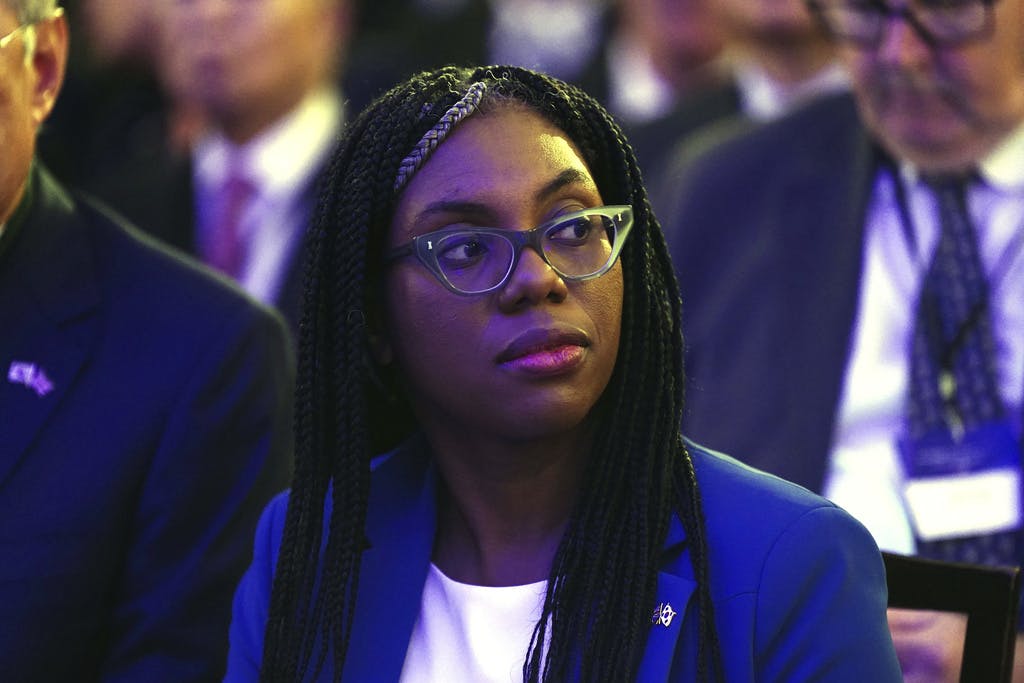Meet Britain’s Rising Star on the Right: Kemi Badenoch Vows No Peace With Terrorists Who Use Rape as a Weapon of War
A Black, pro-Brexit woman holding the Equalities brief in the government is emerging in Parliament as a politician to watch.

Britain’s foreign secretary, David Cameron, has on the matter of Israel been zig zagging like someone who has imbibed too much whiskey. One minute he’s declaring he wants to establish a Palestinian state, the next he’s standing firmly with Prime Minister Netanyahu. Meantime, there is a voice that couldn’t be clearer.
Meet Kemi Badenoch, the ambitious business secretary in Britain’s Conservative government. She also holds the Women and Equalities brief. “There can be no peace with a terrorist organisation that uses children as pawns, rape as a weapon of war and causes the suffering of civilians in Israel and Gaza,” she said on Wednesday at Parliament during a conference about sexual violence.
“We have been clear,” Ms. Badenoch added, “there can be no ceasefire without releasing hostages and without ensuring Hamas is no longer in power.”
Just the fact that she hosted the event, which left many onlookers in tears after the nature of the rapes on October 7 were described, was significant. By venturing into this territory of a foreign war — even if it can be loosely covered under her Women and Equalities title — Ms. Badenoch is emerging as a politician to watch.
Particularly in the event that — as expected — Prime Minister Sunak loses the next election. That could happen by the end of the year. With her straight talking and views favoring small government and Brexit while opposing woke politics, Ms. Badenoch — or Kemi, as most everyone calls her — is emerging as the darling of the Tory party.
And while she came in only fourth in the last leadership election — many deemed her too young and inexperienced — she now has some of the biggest names in the party in her corner. Ostensibly, Ms. Badenoch is not anyone’s idea of a Tory. She’s a feminist Black woman who spent her early life in Nigeria until, at 16, she returned to Britain, where she was born.
Labor may call itself the party of equalities. It may shout about its antiracism values, though they are rather marred in the whole antisemitism furor of the Corbyn years. It has, though, elected white man after white man to its leadership, while the right-wing Tories have gone for talent irrespective of race or ancestry.
They had, under Queen Victoria, their first minority leader in Benjamin Disraeli. There is Mr. Sunak, of course. Michael Howard, a leader who didn’t become PM, was also Jewish. They handed up, in Margaret Thatcher, the first female prime minister. She was eventually followed by Theresa May and the ill-fated Liz Truss.
Could the Tories have, with Ms. Badenoch, the first female minority leader in British history? It is increasingly possible. She is the bookmakers’ favourite to replace Mr. Sunak while a poll of Conservative members put her top of the list with 38 percent of respondents, the closest to her being Penny Mordaunt on 23 per cent.
Since arriving in Parliament in 2017, after a career in consulting, Ms. Badenoch has worked to stay just about adrift of the Tory Party’s fiercely rival groups. Her views on Brexit and wokeness means the right of center factions of the party are immediately attracted to her straight-talking manner.
She has managed to stay silent on the tricky row over the plan to move illegal immigrants to the African country Rwanda. But she is also close to key members of “One Nation,” a centrist group. While some of her fans have been pushing for yet another leadership election, she has firmly told them to stand down and pledged her loyalty to Mr. Sunak.
A mother of three, whose husband is also hoping to become a Tory member of parliament, she sometimes exhibits a sharp tongue but at others a warmth and empathy that can be quite startling in a place as cold as the Palace of Westminster.
She’s also clever. When she stood for the leadership in 2022, many thought it was too early. She’d never, at that point, even held a position in the government. Yet her popularity meant she could no longer be ignored. Now in the Cabinet, she still appears to be a breath of fresh air. The meeting over Israel was a step in expanding her brief and stepping out on the world stage.

